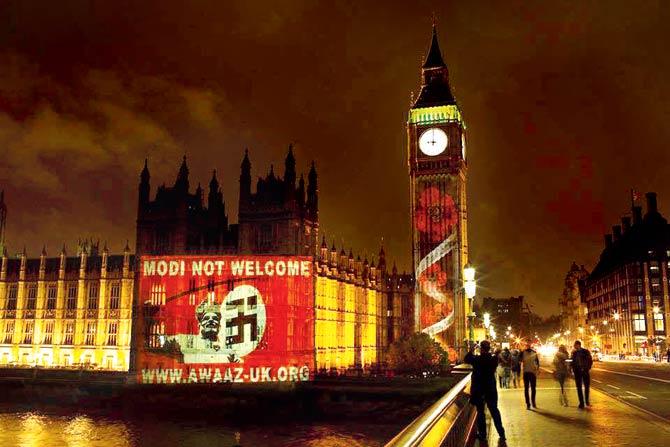Even as Narendra Modi supporters scamper to bag a pass to Friday’s Wembley extravaganza, some Britons of Indian origin refuse to become ‘fan bait’ to help bolster his image back home

On November 8, when London’s Big Ben indicated it was 9 pm, a van parked on Westminster Bridge began to beam an image on to the Palace of Westminster, which houses the British Parliament. Westminster Bridge, which stands over the Thames, is popular, since it is from here that tourists bag the best photos.
ADVERTISEMENT

Awaaz Network projected this image on the Palace of Westminster on Nov 8
For seven minutes, the crimson projection floated above the river, featuring a giant portrait of Indian Prime Minister Narendra Modi waving a sword above his head. In the background, was an Om symbol, with the words ‘Modi not welcome’ written large.
Awaaz Network, who organised this act of protest, say they are a group that promotes secularism. The images were circulated on social media and made news around the world. These details were gathered from Awaaz Network and mid-day is not able to independently verify this event
“Like the voters in Bihar, we want to send a powerful message of rejection through our demonstration, from a large section of Indians abroad and all those who care about human rights,” says Amrit Wilson, member of South Asia Solidarity Group, part of the Awaaz Network coalition.
Public euphoria and business interests tend to grab the news during Modi’s big visits. At Madison Square Gardens last September, protests by groups demanding action on the 2002 carnage in Gujarat and the 1984 anti-Sikh riots were overpowered by the glitzy spectacle of Modi addressing 20,000 people. This time, the expectation is that he will protect and increase the 22 billion dollar worth British investment in India, and promote the nearly 800 Indian companies that operate in the UK.
This is exactly what a small band of Britons, many with Indian roots, are trying to target. This internationalization of protest comes as a counter to the fan-narrative which leads on TV and social media. There is an increasing energy for creating national and now international embarrassment for the Prime Minister, to demand accountability on various political, social and human rights issues. “He can no longer peddle the myth of NRI adulation to try and bolster his image at home,” says Wilson. The projection on Westminster is only the most overt.
Take for example, Modi’s planned address to 60,000 people at Wembley Stadium on November 13. Targeting the 1.5million Indian origin British citizens, it is being pitched as “the Diwali event for the family” and promises “the biggest fireworks display in the whole country.”
For those who are attending, the diasporic excitement stems from “Phir bhi dil hai Hindustani,” says Seema Thobhani, a British citizen raised in Gujarat. “This reception for PM Modi will provide tremendous enrichment for my daughters and for us too,” she says.
To counter this, activists organized Reclaim Diwali, an event of public discussion and cultural performances to “burn the demons of Hindutva Fascism”, that included a fundraiser for survivors of the 2013 Muzaffarnagar riots.
Just as hundreds of members of the Indian community are travelling around the UK on ‘Modi Express’ buses and organizing Hi-Chai events as a spin off from Chai Pe Charcha, so also is the counter movement aggregating. Activists have organised a protest march from 10 Downing Street to Parliament Square. Students at the University of Cambridge and King’s College London also organized public discussions titled ‘We need to talk about Modi’ where they had debates about ongoing issues of intolerance in India.
But back home, for the BJP, the defeat in Bihar and the stream of international criticism, is all taken in stride. BJP Spokesperson Nalin Kohli does point towards the effect of these public actions, though: “Those who undertake protests have to weigh their rights of protest and also the impact in terms of the larger standing of Indian interests and reputation globally. To what extent this would be a comment by the larger British community is a separate question altogether.”
The current British Parliament has a record of 10 MPs of Indian origin including Conservative Preiti Patel and Labour’s Keith Vaz. Last month, a petition on Change.org asked four British MPs, who had reportedly agreed to donate their pay-rises towards the Wembley extravaganza, to reconsider their promise. One of the MPs is Virendra Sharma, a three-time Labour MP from Ealing, Southall, and a first generation immigrant from Jalandhar. When reached for comment, he said he is not donating any money, but does not support boycotts either. Instead, he has sent letters to Cameron and Modi asking for their attention on issues concerning Indians and the Indian diaspora, including the blockade to Nepal, justice for victims of the 1984 riots, and the intolerance shown towards Sudheendra Kulkarni and Ghulam Ali. “If Mr Modi or Mr Cameron fail to address these issues, it will disappoint me and people in Britain, who are looking forward to positive answers,” he says.
At the highest levels, it is possible for the Indian and foreign governments, to skirt issues raised by protestors — after all, every country has internal discontent that must be dealt with by elected representatives. The diasporic excitement only aids this process. But for diasporic activists, the option of creating embarrassing situations, internationalising protest and affecting mainstream discourse, if not diplomatic conversations, remains.
 Subscribe today by clicking the link and stay updated with the latest news!" Click here!
Subscribe today by clicking the link and stay updated with the latest news!" Click here!






